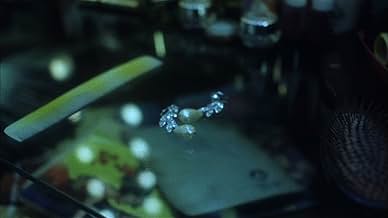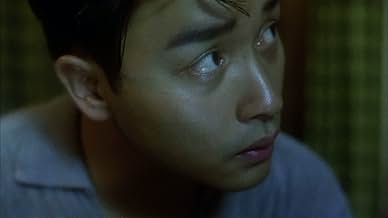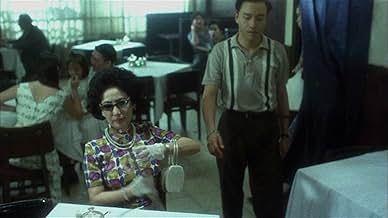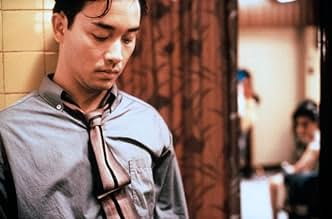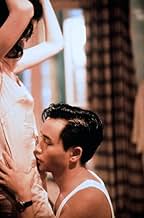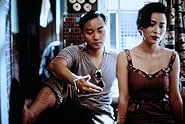IMDb RATING
7.4/10
27K
YOUR RATING
A man tries to find out who his real mother is after the woman who raised him tells him the truth.A man tries to find out who his real mother is after the woman who raised him tells him the truth.A man tries to find out who his real mother is after the woman who raised him tells him the truth.
- Awards
- 17 wins & 9 nominations total
Rebecca Pan
- Rebecca
- (as Tik-Wa Poon)
Tony Leung Chiu-wai
- Chow Mo-wan
- (as Tony Chiu Wai Leung)
- Director
- Writers
- All cast & crew
- Production, box office & more at IMDbPro
Featured reviews
Kar Wai Wong's 2nd feature film is considerably more abstract than his first "As Tears Go By". so if you're looking for a good first Kar Wai Wong film to watch, you should probably start there.
"Days of Being Wild" reminded me very much of the classic French book "The Stranger" by Albert Camus; in fact I wonder if Kar Wai Wong may have been influenced by that book. Both stories center around a young man who is very unemotional except at times of explosive violence. Both stories show the young man to have severe mommy issues, i.e. a disconnection from his mother resulting in never learning how to show love and caring. And in both stories, the main character follows a very existentialistic path in life. He goes wherever life may take him with no connection to people or places.
The main character is not very likable. In fact he's a downright jerk toward women. But this ties in with the story of him trying to find his mother who abandoned him when he was a child. At the same time we see the interweaving of 4 other characters: 2 girlfriends, 1 devoted friend who falls for one of the girlfriends, and a policeman who enters the story by chance. Oh yeah, there's also the young man's rich aunt (adoptive mother) and a string of men she keeps.
It may be tough keeping up with all the characters, especially when the story starts moving to different locations. Certain events may seem random, but in the end it all comes together with a very poetic thought.
If you're a cinema geek, you'll love this film for its sheer technical achievements. A lot of scenes are shot with reflections & mirrors, allowing us to see the faces of different people simultaneously (without the camera jumping back & forth to whoever is talking). For example, the camera may be on a woman while she talks to a man. He is in front of the camera with his back to us, but we see his face & expressions in the reflection of a bathroom mirror behind the woman. Yea, I'm a cinema geek so I love stuff like that. If you like little details, you'll have a great time watching "Days of Being Wild".
"Days of Being Wild" reminded me very much of the classic French book "The Stranger" by Albert Camus; in fact I wonder if Kar Wai Wong may have been influenced by that book. Both stories center around a young man who is very unemotional except at times of explosive violence. Both stories show the young man to have severe mommy issues, i.e. a disconnection from his mother resulting in never learning how to show love and caring. And in both stories, the main character follows a very existentialistic path in life. He goes wherever life may take him with no connection to people or places.
The main character is not very likable. In fact he's a downright jerk toward women. But this ties in with the story of him trying to find his mother who abandoned him when he was a child. At the same time we see the interweaving of 4 other characters: 2 girlfriends, 1 devoted friend who falls for one of the girlfriends, and a policeman who enters the story by chance. Oh yeah, there's also the young man's rich aunt (adoptive mother) and a string of men she keeps.
It may be tough keeping up with all the characters, especially when the story starts moving to different locations. Certain events may seem random, but in the end it all comes together with a very poetic thought.
If you're a cinema geek, you'll love this film for its sheer technical achievements. A lot of scenes are shot with reflections & mirrors, allowing us to see the faces of different people simultaneously (without the camera jumping back & forth to whoever is talking). For example, the camera may be on a woman while she talks to a man. He is in front of the camera with his back to us, but we see his face & expressions in the reflection of a bathroom mirror behind the woman. Yea, I'm a cinema geek so I love stuff like that. If you like little details, you'll have a great time watching "Days of Being Wild".
There is an unpolished, raw, kind of grimy feeling to this film, one which maybe fits the sad, lonely little lives of these characters, few of whom are likeable. A young playboy (Leslie Cheung) who "hates work" treats a couple of women like disposable objects, and yet they can't seem to stop loving him. It's a type of story I'm not all that fond of, even if we gradually understand one of the things that seriously damaged him, and maybe made him into the self-centered asshole we see before us. His mother gave him up for adoption, and his stepmother only took him so she could get a regular paycheck. It was quite hard to empathize with him though, and I disliked the misogynistic overtones of the film. Even his nerdy friend gets in on it, slapping his second girlfriend (Carina Lau) around in the rain after she's been abandoned. My favorite moment was when a kind police officer tries to talk some sense into the first girlfriend (Maggie Cheung), and after they part, he narrates:
"I never really thought she'd call. But every time I passed by the phone booth, I'd stand there for a while. Maybe she's all right and she made it back to Macao. Or maybe she just needed someone to help her through that one night. Soon after that, my mother passed away, and I became a sailor."
The film desperately needed more humanizing touches like that, or some level of self-reflection or philosophy deeper than its bird metaphor. The painting of emptiness and loneliness that Wong Kar-wai gives us is undercut without it, though I did like some of the artistry in his camera work. Oh, and if you're as puzzled as I was about the character seen at the very end, it's a somewhat random/minor character who was meant to be the main character of the second part of the story, a film which was never made. Somehow the meaninglessness of that fits, though I'm not sure it's in a good way.
"I never really thought she'd call. But every time I passed by the phone booth, I'd stand there for a while. Maybe she's all right and she made it back to Macao. Or maybe she just needed someone to help her through that one night. Soon after that, my mother passed away, and I became a sailor."
The film desperately needed more humanizing touches like that, or some level of self-reflection or philosophy deeper than its bird metaphor. The painting of emptiness and loneliness that Wong Kar-wai gives us is undercut without it, though I did like some of the artistry in his camera work. Oh, and if you're as puzzled as I was about the character seen at the very end, it's a somewhat random/minor character who was meant to be the main character of the second part of the story, a film which was never made. Somehow the meaninglessness of that fits, though I'm not sure it's in a good way.
I like movies where outcast characters drift through the margins of life in search for not simply meaning, this is a grand word and drifters don't have much time for grandstanding, but a small warm corner they can call their own, and there's a lot of drifting in Days of Being Wild, literal and figurative. This is one of those great movies that speak of what it means to be young and alienated, not in the angsty living-room sense of the term, but in the form of real tangible problems, the ones you face alone in the cheap room of a fleabag hotel or in an empty warehouse in the hours after work. Days of Being Wild to me is like a procession of life, in the small hours of the night, filled with beauty and pain.
Now when all the normal people with steady jobs and a steady family have gone to sleep, all those still hanging in the balance of existence come out and fly beneath the cold street lamps. Now and then their wings touch, for a fleeting moment, and then they're alone again, flying in circles around the street lamps, like a moth instinctively drawn to something that is bright and warm. This reminds me of the line spoken by Warren Oates in that quintessential American movie about alienation and drifting, Monte Hellman's Two-Lane Blacktop: "if I'm not grounded soon, I'm gonna go into orbit". Hollywood rarely understands this type of character. Only someone who has never experienced that directionless orbit can glorify the drifting. The characters here need to be grounded soon. They need human warmth and affection and to know that there's a place they can come back at night and call it home.
We usually think of a drifter as someone who sets off into the desert, into a bleak barren landscape, it's probably easier that way. It takes a step back to look at life around us, as we wait for the subway in crowd, to realize a drifter can be a drifter among people. American film noir treats the city as an 'asphalt jungle', while for some reason Asians seem to tap into the melancholy of the 'asphalt desert'. I'm thinking films like Johnnie To's PTU and Takashi Miike's Rainy Dog. This is one of those films. One of the characters is a cop who does a latenight patrol, always wandering around empty streets by himself. He confesses a little later, that he wanted to be a sailor. The metaphor is poignant.
But at the same time Wong-Kar Wai says a lot of things about compulsion, that driving monomania that sets these people into orbit, and disassociates them from the world. I like how all this plays out in a 50's Hong Kong of cold blue lights and wet streets reflecting neon lights from a distant shop sign. It's not Chungking Express yet, and I'm glad that it's not, Chungking is a vibrant colorful place, and this one is a world that begins a corner down the street from it, where the bustle of city life, where the other people live their lives, is but a faint echo. In fact, until the movie washes up in the Phillipines to get involved in a brawl and take the night train out of the world, we hardly see any people outside the six characters, the small birds whose wings touch now and then.
This is raw and touching and real, like the best of gritnik cinema done by a romantic. Sam Peckinpah was another big romantic of gritnik cinema, but his romance was masculine and fatalist, he was speaking about the ends of things. Wong-Kar Wai tells us about love and obsession, and what it takes for something to begin. Good stuff.
Now when all the normal people with steady jobs and a steady family have gone to sleep, all those still hanging in the balance of existence come out and fly beneath the cold street lamps. Now and then their wings touch, for a fleeting moment, and then they're alone again, flying in circles around the street lamps, like a moth instinctively drawn to something that is bright and warm. This reminds me of the line spoken by Warren Oates in that quintessential American movie about alienation and drifting, Monte Hellman's Two-Lane Blacktop: "if I'm not grounded soon, I'm gonna go into orbit". Hollywood rarely understands this type of character. Only someone who has never experienced that directionless orbit can glorify the drifting. The characters here need to be grounded soon. They need human warmth and affection and to know that there's a place they can come back at night and call it home.
We usually think of a drifter as someone who sets off into the desert, into a bleak barren landscape, it's probably easier that way. It takes a step back to look at life around us, as we wait for the subway in crowd, to realize a drifter can be a drifter among people. American film noir treats the city as an 'asphalt jungle', while for some reason Asians seem to tap into the melancholy of the 'asphalt desert'. I'm thinking films like Johnnie To's PTU and Takashi Miike's Rainy Dog. This is one of those films. One of the characters is a cop who does a latenight patrol, always wandering around empty streets by himself. He confesses a little later, that he wanted to be a sailor. The metaphor is poignant.
But at the same time Wong-Kar Wai says a lot of things about compulsion, that driving monomania that sets these people into orbit, and disassociates them from the world. I like how all this plays out in a 50's Hong Kong of cold blue lights and wet streets reflecting neon lights from a distant shop sign. It's not Chungking Express yet, and I'm glad that it's not, Chungking is a vibrant colorful place, and this one is a world that begins a corner down the street from it, where the bustle of city life, where the other people live their lives, is but a faint echo. In fact, until the movie washes up in the Phillipines to get involved in a brawl and take the night train out of the world, we hardly see any people outside the six characters, the small birds whose wings touch now and then.
This is raw and touching and real, like the best of gritnik cinema done by a romantic. Sam Peckinpah was another big romantic of gritnik cinema, but his romance was masculine and fatalist, he was speaking about the ends of things. Wong-Kar Wai tells us about love and obsession, and what it takes for something to begin. Good stuff.
There is a two-minute action sequence, but that is NOT what this masterpiece is about. 'Days of being wild' has to be the best film of Wong Kar-Wai or at least MY favourite. There are three stories (in one) that feel like film-noir now and then, but are principally about the distance in several different relationships. Kar-Wai lets his characters struggle with urban loneliness and lets them search indefinitely, unable to settle down. They only have the chance to create 'One Minute Friendships' that might seem magic but don't offer satisfaction and have to be ended. The quest continues. Won Kar-Wai poses the question whether you have lived actually when you've searched all your life for friendship/love. Two or three voice-overs scarcely help the portrayal of the characters, but only when the story allows it. I prefer this film over Chungking Express anytime. One reason for that is the great use of music here, while his other films tend to drown in the excessive use of western music. The acting is also really brilliant in this eclectic work.
Subtle and masterly cinematography by Christopher Doyle (Chungking Express, Fallen Angels '95): less colorful than 'In the mood for love', but therefore more applicable for the fifties. Moreover, the dynamics are also much more subtle than everything Kar-Wai and Doyle have done up till now. In contrast: Happy Together and Fallen Angels were brilliantly photographed because there it was more appropriate to use dynamic cinematography (more temperament). It's only Kar-Wai's second film but still his most solid and memorable and maybe even more internationally appealing than 'In the mood for love', without making compromises or getting sentimental. I just can't think of anything that is not good in 'Days of being wild'.
10 points out of 10 :-)
Subtle and masterly cinematography by Christopher Doyle (Chungking Express, Fallen Angels '95): less colorful than 'In the mood for love', but therefore more applicable for the fifties. Moreover, the dynamics are also much more subtle than everything Kar-Wai and Doyle have done up till now. In contrast: Happy Together and Fallen Angels were brilliantly photographed because there it was more appropriate to use dynamic cinematography (more temperament). It's only Kar-Wai's second film but still his most solid and memorable and maybe even more internationally appealing than 'In the mood for love', without making compromises or getting sentimental. I just can't think of anything that is not good in 'Days of being wild'.
10 points out of 10 :-)
Though it has been argued that 'A Fei Zheng Chuan' (aka 'Days of Being Wild') is the first set of the trilogy which is completed by 'Fa Yeung Nin Wa' (aka 'In the Mood For Love') and '2046', it 'looks' different from the other two films. Kar Wai uses less colour, more shadow, rain and heat and more rawness. The tone is much darker than in 'Fa Yeung Nin Wa' as the film is set in the 50s. The music is beautiful and effectively used. And, here too Kar Wai ends up making a powerful product. Though this film was a box office failure, it is an artistic victory.
'A Fei Zheng Chuan' tells the story of 6 individuals whose lives are interconnected by each character's search and struggle for an identity. It's about loneliness, unrequited love, lost love, the search for love, and how the search continues. Kar Wai clevely brings up the theme of sex (without showing any nudity). The writing is excellent and the characterization is strengthened by superb and unique performances. The late Leslie Cheung's Yuddy is not a very likable person but we do sympathize with this man and recognize him. Maggie Cheung as Su gives one of the most subtle and finest performances. Carina Lau is energetic and terrific as Mimi. Rebecca Pan gracefully downplays her part. Andy Lau's Tide and Jacky Cheung's Zeb too are relatable and the actors are nothing short of remarkable. Actually, I recognize all the characters in this film.
I loved the cinematography, especially the long shots. One of my favorite shot is the introduction of the scene that glides from the Phillipine streets to Yuddy and Tide in a lunch bar. This is one fine example of skillful camera-work. The shaky camera (which thankfully isn't overdone) and the close-ups that mostly take place during conversations and intimate moments between two characters work very well. Doyle's camera-work simply guides us through the lives of these characters.
Summing it up, 'A Fei Zheng Chuan' works on many levels. It is an excellent study of characters, it 'tells' a universal story in a poetic way and it is a fine cinematic experience.
A bird that never lands will one day suddenly seize to exist.
'A Fei Zheng Chuan' tells the story of 6 individuals whose lives are interconnected by each character's search and struggle for an identity. It's about loneliness, unrequited love, lost love, the search for love, and how the search continues. Kar Wai clevely brings up the theme of sex (without showing any nudity). The writing is excellent and the characterization is strengthened by superb and unique performances. The late Leslie Cheung's Yuddy is not a very likable person but we do sympathize with this man and recognize him. Maggie Cheung as Su gives one of the most subtle and finest performances. Carina Lau is energetic and terrific as Mimi. Rebecca Pan gracefully downplays her part. Andy Lau's Tide and Jacky Cheung's Zeb too are relatable and the actors are nothing short of remarkable. Actually, I recognize all the characters in this film.
I loved the cinematography, especially the long shots. One of my favorite shot is the introduction of the scene that glides from the Phillipine streets to Yuddy and Tide in a lunch bar. This is one fine example of skillful camera-work. The shaky camera (which thankfully isn't overdone) and the close-ups that mostly take place during conversations and intimate moments between two characters work very well. Doyle's camera-work simply guides us through the lives of these characters.
Summing it up, 'A Fei Zheng Chuan' works on many levels. It is an excellent study of characters, it 'tells' a universal story in a poetic way and it is a fine cinematic experience.
A bird that never lands will one day suddenly seize to exist.
Did you know
- TriviaThe film was supposed to be the first part of a project. But due to its relatively poor performance at the box office when it was first released, the producers decided not to finish the second part. The nameless character that appears in the last scene played by Tony Leung Chiu-wai is supposedly the main character in the second part.
- GoofsWhen Tide checks into the hotel, the hotel manageress hands him the key to Room 206. However, in the next scene, Tide uses the key to enter Room 204. This, however, may not be so much a 'goof' as another recurrence of the number '2046' seen so often in Wong Kar-Wai's films.
- Alternate versionsA different 35mm print of the film features an altered prologue sequence and different edits during the final scenes of the film. This version decreases the length of the film from 95 to 94 minutes.
- ConnectionsFeatured in Nian ni ru xi (1997)
- SoundtracksJungle Drums (Cantonese cover)
Music by Ernesto Lecuona & J. Cacabas
Lyrics by Sharon Chung
Performed by Anita Mui
- How long is Days of Being Wild?Powered by Alexa
Details
- Release date
- Country of origin
- Official site
- Languages
- Also known as
- Days of Being Wild
- Filming locations
- Production company
- See more company credits at IMDbPro
Box office
- Gross US & Canada
- $146,310
- Opening weekend US & Canada
- $18,090
- Nov 21, 2004
- Gross worldwide
- $3,255,660
- Runtime1 hour 35 minutes
- Color
- Aspect ratio
- 1.85 : 1
Contribute to this page
Suggest an edit or add missing content



